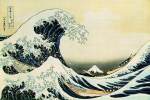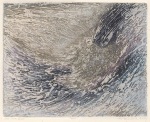 The other day, at a book release at our neighbouring Central University, MANUU, I heard the chief guest quote Allama Iqbal. Apparently (or so I gathered) when his son was setting off for higher studies in London, the great poet said to him: … خدا تجھے کسی طوفان سے آشنا کر دے کے تیرے باہر کی موجوں میں اضطراب نہیں (Khuda tujhe kisi toofan se ashna kar de, ke tere bahr ki mojon mein iztirab naheen).
The other day, at a book release at our neighbouring Central University, MANUU, I heard the chief guest quote Allama Iqbal. Apparently (or so I gathered) when his son was setting off for higher studies in London, the great poet said to him: … خدا تجھے کسی طوفان سے آشنا کر دے کے تیرے باہر کی موجوں میں اضطراب نہیں (Khuda tujhe kisi toofan se ashna kar de, ke tere bahr ki mojon mein iztirab naheen).
I’ve looked for translations, and while none of them captures the nuance of the Urdu, the closest I could find is May God grant you a storm! The voyage of your life is on too placid an ocean…
 Literally, though the verse reads in translation, “May God bless you with some storm, because the waves in your ocean (of self) are devoid of agitation (turmoil)”. There is the resonance with Shakespeare, when Brutus talks of the “tide in the affairs of men.
Literally, though the verse reads in translation, “May God bless you with some storm, because the waves in your ocean (of self) are devoid of agitation (turmoil)”. There is the resonance with Shakespeare, when Brutus talks of the “tide in the affairs of men.
Which, taken at the flood, leads on to fortune; […] And we must take the current when it serves“, as well as the famous Chinese curse, May you live in interesting times!
The appositeness of the advice is something I have had occasion to reflect upon, as we pass through these interesting times. We at the UoH have such great privileges- our campus, its freedoms, its autonomy- and one cannot but feel that we should be doing something more. More what, one might well ask, so to turn the question around, is what we do enough? Just enough, barely enough or well enough? These are questions for which there are many answers, so all things considered, I think it is preferable that we have the occasional iztirab, a little anxiety, a little uneasiness. A state when we are not too comfortable is more conducive to self-examination, and thereby one hopes, to more discussion, creativity, and thereby to evolution.
But not too much discomfort, though! In the fluid case, in some ways the most interesting situation is that of intermittency, when there is smooth flow much of the time, interrupted by staccato bursts of turbulence. As much as we need the iztirab to evolve, we also need some undisturbed period to think, and to consolidate… But that is not a luxury one can always be assured of! There are enough forces at work and play both inside the University and outside it, that make this an ongoing challenge.
The images of the turbulent waves above are by artists whose work has been very inspirational: the iconic and familiar print by Hokusai and closer to home, the wave by Krishna Reddy, the great printmaker who lives in New York and who taught for many years at NYU.

Thank u sir for reminding us of a nice chapter of literary taste. Science of literature in the eyes of a scientist………….
On Mon, Sep 30, 2013 at 9:01 AM, A central Central University wrote:
> ** > Ram Ramaswamy, Vice Chancellor UoH posted: “The other day, at a book > release at our neighbouring Central University, MANUU, I heard the chief > guest quote Allama Iqbal. Apparently (or so I gathered) when his son was > setting off for higher studies in London, the great poet said to him: … > خدا تجھے “
Turbulence is nothing to romanticize. The most dreaded turbulence (for most of the lesser mortals) is the “clear air turbulence”, that is fortunately not close to ground but around 10 km above the ground and wikipedia has a rather nice article on it (https://en.wikipedia.org/wiki/Clear-air_turbulence). Of course sometimes you may think that as nothing compared to the turbulence at the ground level in parts of Gachhibowli that has the power to rock the hcu.
But still, the best lecture on turbulence I believe was given by Gandhari (Mrs Dhritarastra) to her eldest daughter-in law, Bhanumati (Mrs Duryadhonaya)- on the impending war. Or, if you don’t like to travel far into the past, the true story of Ashani Sanket (in which Churchill murdered millions of helpless poor people of Bengal).
I first read about the curse in a book by Richard Gott on time travel. Interesting.
Allama Iqbal’s verse is I think quite fundamental and struck a chord with me.
Turbulence is fascinating – whether in physics or in emotions.
I suspect that it is necessarily inherent in all “change” and without “change” there is only stasis and nothingness (as an extreme of “placidity”).
It is not something to be feared but to be met.
“Will no one rid me of this turbulent priest?” attributed to Henry II about Becket.
“Turbulence is the most important unsolved problem of classical physics”.- Richard Feynman
“Turbulence is life force. It is opportunity. Let’s love turbulence and use it for change” – Ramsey Clark
Very beautifully expressed. Urdu is indeed a very beautiful and poetic language.
Amazing insight! Very eloquent, indeed!